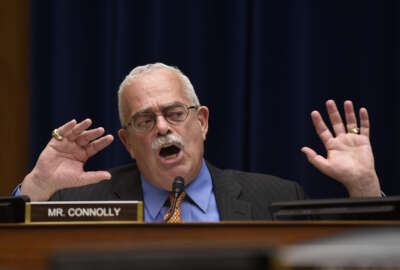
Worried about possible retirement changes? 3 pieces of advice from a federal financial planner
Plenty of proposals exist that suggest significant changes to the federal retirement system. Financial planners say federal employees should hope for the best and...
Subscribe to Federal Drive’s daily audio interviews on iTunes or PodcastOne
With more and more complicated proposals calling for changes to the federal retirement system, public service employees are thinking more about financial planning now than ever before.
Just last week, the House passed a budget resolution that includes reconciliation instructions that charges the Oversight and Government Reform Committee to develop legislative proposals to reduce the federal deficit by $32 billion over 10 years through reforms to civil service pensions.
The president’s 2018 budget proposal includes similar, if not slightly more detailed, recommendations for changes to the federal retirement system.
Many of the proposals have been around for years, if not decades.
Talk of these proposals has kept organizations like the Government Employees’ Benefit Association (GEBA) busier than ever.
Greg Klingler, director of wealth management at GEBA, has tracked these retirement proposals and others for years. He has three main pieces of advice that federal employees should consider as they manage their retirement and health care.
1. Make a plan
GEBA, a non-profit, was originally founded as a resource for National Security Agency employees, but the association’s work has grown as federal employees’ needs have changed.
The association recently launched a wealth management division, as more federal employees have questions about managing their financial futures.
“Three decades ago, a financial planner really didn’t have a lot of work to do with a federal employee,” Klingler said. “They had the Civil Service Retirement System, they had this great pension paying 80 percent of their salary with great cost of living adjustments. Today that’s changed, and federal employees really should think about a financial plan, especially if the changes to the FERS program go through.”
New proposals calling for changes to the federal retirement system aren’t the only reason why federal employees should consider making a financial plan, Klingler said. Federal employees are working longer, and Americans in general are living longer.
Many customers who come to GEBA are working five days and 40 hours a week well into their late 70’s or early 80’s, Klingler said. They’ve maxed out their Civil Service Retirement System (CSRS) pensions and want to know how to make the best decisions about their health care, retirement and life and long-term care insurance.
Others who retire at age 55 come to the association and have questions about how they can best plan for 20-to-30 years of retirement, he said.
2. Control what you can
The best financial plans keep one simple premise in mind: control the things you can control, Klingler said.
Three major pieces make up the Federal Employees Retirement System (FERS): a defined benefit pension, Social Security and the Thrift Savings Plan.
Of these pieces that make up the FERS “three-legged stool,” the defined benefit is perhaps most subject to congressional changes.
Many of the retirement proposals under congressional consideration suggest, in some form or another, new formulas that would make federal employees contribute more toward their pensions.
“People think of the FERS pension program as the engine behind their retirement,” Klingler said. “That’s what they focus on, [and] that’s what they spend their time thinking about. With the changes that we’re talking about, maybe that’s not such a good idea anymore. We can’t necessarily control what happens with FERS. Obviously, we can talk to our legislators and we can call our congresspeople. … The one thing that we can control, the one piece of the puzzle or the one leg of the three-legged stool that we can control is the TSP.”
Yet with roughly 45 percent of current TSP investments in the low-return, low-risk G fund, many federal employees are missing an opportunity to invest more heavily in higher-risk funds that may offer a higher return, Klingler said.
“In most cases, investing 100 percent of your money in the G fund is not the best choice,” he said. “When you hear the word ‘risk,’ a lot of people think zero risk is the best. That’s not the case. In most cases, you want to have risk, because with risk, comes reward. You want to have the appropriate level of risk that matches your risk tolerance and your investment time horizon. Taking a focus on that and really looking at having the TSP grow, will take a lot of the pressure off the need to get as much money as possible from the FERS program and from the CSRS program.”
3. Take Open Season seriously
Federal employees and retirees have more than 260 plans to consider under the Federal Employee Health Benefits Program (FEHBP).
As most participants are expected to pay an average of 6.1 percent more toward their premiums in 2018, Klingler advises FEHBP enrollees take open season seriously.
Open season for 2018 coverage starts Nov. 13 and ends Dec. 11.
First, Klingler suggests FEHBP enrollees check each year that their preferred doctors will remain in their network of choice.
The same applies to the Federal Employees Dental and Vision Insurance Program.
“Make sure your dentist is in the network,” Klingler said. “If you do need a major amount of medical work, primarily that revolves around implants, read the fine print. Fine print is very important with those procedures.”
The average vision plan premium will actually decrease slightly by 0.48 percent in 2018. Because average vision plans are typically low, FEHB participants should considering buying a FEDVIP plan if they wear contacts or glasses, Klingler said.
Certain federal employees may also consider a FEHB plan with a high deductible, he said.
“If somebody goes to the doctor very infrequently or only goes for wellness visits, you could very much benefit from a high deductible plan,” Klingler said. “[With] most of these plans, they actually help fund on your behalf out of the plan, a health savings account. [It’s] an account that accrues money, that can accrue interest, that is not use-it-or-lose-it and can ultimately last until your retirement and can be used to pay for deductibles at a future time.”
Copyright © 2025 Federal News Network. All rights reserved. This website is not intended for users located within the European Economic Area.
Nicole Ogrysko is a reporter for Federal News Network focusing on the federal workforce and federal pay and benefits.
Follow @nogryskoWFED





